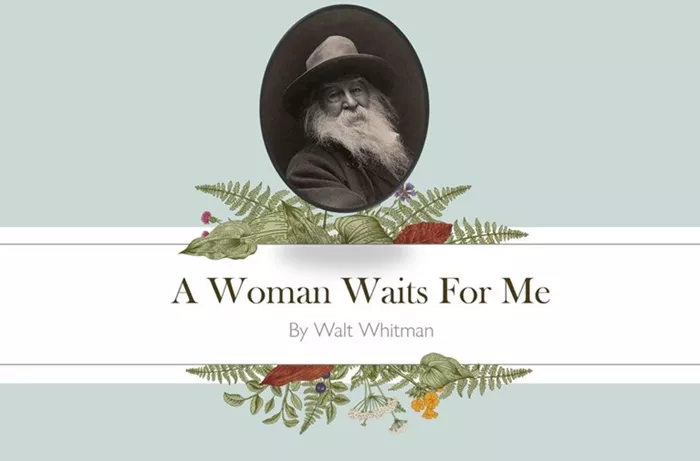Welcome to Poem of the Day – A Woman Waits for Me by Walt Whitman.
Walt Whitman, one of America’s greatest poets, is known for his bold and revolutionary work. In A Woman Waits for Me, Whitman presents a powerful poem that celebrates love, sexuality, and creation. This piece, found in his collection Leaves of Grass, expresses themes of equality, passion, and the connection between the physical and spiritual. Let’s explore the meaning, themes, and poetic devices in this poem.
A Woman Waits for Me Explanation
Introduction to the Poem
Whitman’s A Woman Waits for Me explores the deep union between man and woman. It highlights how love and physical connection lead to the creation of life. The poem also challenges traditional views of sexuality by celebrating it openly. Whitman’s tone is confident and unapologetic, urging readers to embrace their desires and the natural aspects of human life.
Themes in the Poem
Equality in Love
Whitman views men and women as equals in love and creation. He emphasizes that both genders have an essential role in the cycle of life. The poem rejects the idea of dominance or submission in relationships, promoting mutual respect.
Celebration of Sexuality
The poem speaks candidly about the physical union between a man and a woman. For Whitman, this union is not shameful but sacred and necessary. He removes any sense of taboo, presenting sexuality as a natural and joyous part of life.
Creation and Continuity
A central theme in the poem is the power of love and physical connection to create life. Whitman connects the act of love with the broader cycle of life, portraying it as a divine process that ensures the continuity of humanity.
Connection Between Body and Soul
Whitman does not see the body and soul as separate. Instead, he blends them, showing how physical and emotional intimacy unite to form a complete human experience.
Analysis of Key Lines
“It is I, you women—I make my way; / I am stern, acrid, large, undissuadable—but I love you,”
Here, Whitman introduces himself as the speaker. He is strong and resolute, but his love and admiration for women are profound. The line captures the intensity of his emotions and the depth of his respect.
“Without shame, the man I like knows and avows the deliciousness of his sex, / Without shame, the woman I like knows and avows hers.”
Whitman rejects societal shame associated with sexuality. He encourages both men and women to embrace and celebrate their identities and desires.
“Through you I drain the pent-up rivers of myself.”
This metaphor illustrates the release of emotions and desires that occurs through intimacy. Whitman’s language here is passionate, emphasizing the transformative power of love.
Poetic Devices
Repetition
Whitman often uses repetition to emphasize key ideas. In this poem, phrases like “without shame” reinforce his message of embracing love and sexuality.
Free Verse
The poem is written in free verse, which allows Whitman to express himself without strict structure. This mirrors the poem’s themes of freedom and natural expression.
Imagery
Vivid imagery brings the poem to life. Whitman’s descriptions of physical and emotional experiences create a powerful connection with the reader.
Metaphors
The use of metaphors, such as comparing emotions to rivers, deepens the meaning of his words. These devices add layers to the poem’s themes.
The Poem’s Impact
When Leaves of Grass was published, Whitman’s candid approach to love and sexuality shocked many readers. However, over time, his work gained recognition for its honesty and artistic brilliance. A Woman Waits for Me continues to resonate with modern audiences, offering a timeless message about love, equality, and human connection.
Conclusion
A Woman Waits for Me by Walt Whitman is a celebration of life, love, and creation. It challenges societal norms and invites readers to embrace their desires and humanity fully. Through his bold words and vivid imagery, Whitman captures the essence of connection between man and woman. This poem stands as a testament to his vision of love as a sacred, natural force that unites and sustains us all.

